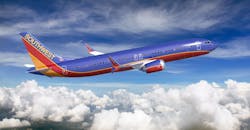FAA Criticized for Proposed 737 MAX Training
The Federal Aviation Administration has closed the comment period for its proposed, Boeing 737 MAX pilot training module, and is drawing criticism from pilot unions that the standards are too complex to be effective in addressing the safety concerns that grounded the aircraft program and prompted more than a year of design and technical revisions.
The 737 MAX is a twin-engine, narrow-body aircraft and Boeing’s best-selling series, though it has been grounded worldwide since March 2019 following two crashes that killed 346 passengers and crew members. Boeing continues to hope FAA will grant a new airworthiness certification to the revised jet series.
In the 19 months since the grounding Boeing has updated the aircraft’s Maneuvering Characteristics Augmentation System (MCAS), the flight control software cited as the cause of the two crashes. Reportedly, the previous flight-control software misidentified the jets' "angle of attack" (AOA), and prevented the Lion Air and Ethiopian Airlines pilots from overriding an automated descent that resulted in the two incidents. Reportedly the new program draws more sensor data from the
In October, following several months of reviewing and testing the revised program, FAA publicized a summary of the program changes it requires for the aircraft, and released a draft of the new training procedures it will require for 737 MAX flight crews.
Among other requirements, 737 MAX pilots must complete simulator training with the new MCAS before they can resume flights, including training for multiple flight-deck alerts, how to recognize AOA malfunctions, and how to respond correctly to a runaway stabilizer problem.
Among the public comments received by FAA, the union representing Southwest Airlines (previously the largest 737 MAX operator) pilots characterized the new training module and emergency checklists as “clunky at best,” and added that both should be streamlined in order to be effective.
The Allied Pilots Assn., representing American Airlines pilots, seeks additional training for handling emergencies at high speeds.
Some individual commenters pressed for FAA to allow pilots to use less sophisticated flight simulators that may be more available during the COVID-19 pandemic.
In addition to these, a group representing those killed in the March 2019 crash of an Ethiopian Airlines 737 MAX contends that the design revisions and published training procedures are not enough to correct “Boeing’s history of 737 MAX-related failures and insufficient to prepare pilots to safely fly the airplane.”
